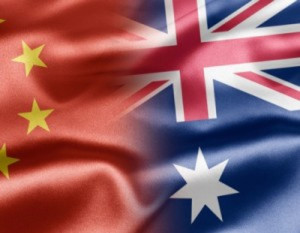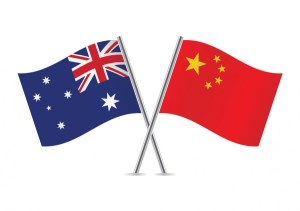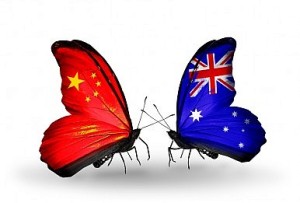 “So many people living in the world, they all have something in common.”
“So many people living in the world, they all have something in common.”
I dare not compare myself with great people such as Sun Yat-sen and Lu Xun, but like them I also started by learning medical skills. Having medical skills can relieve patients from illness, but cure few. Although my medical skill could heal their physical ailments, I was unable to heal their mental anguish. I wanted to do more for them. Thus came the thought of entering politics.
My ancestors were from Hangzhou, Zhejiang Province, but I was born in Shanghai, then went to Japan. In Japan, due to various reasons I didn’t feel comfortable; my parents thought it would be better to go to an English- speaking country. Since I wanted to be a doctor, at the end of 1980, I came to Australia from Japan to study medicine. At that time, U.S. was strongly anti-Chinese, but Australia seemed to be more willing to accept foreign students, but to study medicine was still very hard. After a lot of setbacks, I finally went to the medical college.
At the beginning it was not easy for me to integrate into the local culture, environment and other aspects of life. In Australia, medicine is the most difficult major, especially for foreign students. Therefore I made up my mind to learn biology first and enter the medical school as soon as my score was good enough. In fact, it was not so easy. I got a degree, but failed to find work in the hospital. Then I tried to find a job wherever I could. Finally, a hospital in Melbourne invited me to work there, and guaranteed me a position, so I decided to accept their offer.
At that time, when a employer nominated someone to come and work, they found that many foreign students stayed for a time, later, their parents would come along too, but it was very difficult for them. It was because of the so-called “three NOs: eyes cannot see, ears cannot hear, and mouth cannot say”. The only thing the elders could do was to count the number of vehicles back and forth, or to walk around on the streets. They felt very depressed. However, I firmly believe that if you come to this country you must try to integrate yourself into this society.
After a while, my language and other aspects of adapting to a new life were better than other foreign students. Therefore, many people, both Chinese and European Australians encouraged me to participate in politics. The first step into politics was the local government. In 2002, I was nominated in city council elections and won. I was probably the first councilor with a Chinese mainland background in Australian history.
Many people have asked me whether it is hard to participate in the election. I would ask him: Have you ever tried to knock on thousands of doors? Sometimes when you knock on a door, people open the door and when they see that you are from Asia, they are not interested. What’s worse, they may be Liberal Party voters. You have to explain to them your policy agenda, they will feel that although you are from Asia, you speak the same language as they do, even if you are a Labor Party member but have reasonable policies, they might choose you. What is important is to win as many votes as possible. It is the most important thing in a democratic society. They would not vote you at the very beginning, but would finally choose you, which gave me a great sense of accomplishment.
Later, after a few of years of being a City Councilor, I lobbied eight other members of council. By their unanimous recommendation, I was elected to be mayor in 2006, becoming the first Chinese mayor with a mainland background. In fact, my salary as a doctor was higher than what I was paid in politics. Why did I do it? I really wanted to do something for the Chinese community. The honors I achieved, I would like to share, which is the pride of the Chinese, and especially it is the pride of Chinese Australians. After 2006, I was re-elected for three terms. After 2012 I didn’t take part in the re-election campaign, I had served 10 years on council; I wanted to have a break.
Of course, this journey was very long and also very hard. Towards mayors and councilors, people have two kinds of reactions, one view is that mostly you eat out and attend events, so it is quite glorious. I would half-jokingly say that I would rather go home for supper with my wife and kids, and happily stay at home. A few days ago, I was invited to a council activity. They said to me that I had a enjoyable time, but I replied that it was not enjoyable, it was work.
Others can well understand that being a politician is really hard. Some may ask: what do you do every day as a councilor and mayor? You can work part-time in the municipal government, but have to work full-time in the federal or state government. In addition to your own work, you have to do the government’s assignments. All decisions are made by votes, and the mayor has only one vote. Interestingly, when I was mayor, I was invited to visit China. People would like to ask, how much public money I could approve in a year. I said I had no authority to approve and grant any funds. As a mayor, I had one vote only. My responsibility was to preside over the meeting, and in other aspects I was the same as ordinary members. For example, our members voted on an issue, and the voting result was 5 to 4, then we followed the majority decision; this is the way council operates.
Many people asked what benefits I received from being a politician. I said no benefits, but a lot of disadvantages. I had to spend double or triple the energy to work, and work for the entire Chinese community in Australia, not just for money. Therefore you must not have a narrow view of things, instead you have to see the future. I’ve been thinking about the Chinese community here, for the Chinese Australians, we should have a positive attitudes, think like a leader. We should not think we are just ordinary people, and let it be; or choose to ignore it due to old age, and leave it to the kids. It is the wrong attitude; we must have the mentality of a community leader. If we do not strive, nobody would place anything on our plate. Anyway it doesn’t mean that we rob or cheat, but we just fight for the rights we deserve.
Once, a Chinese person accidentally died. Chinese people are usually willing to sit on the first and second rows on the rostrum at celebrations, but on such an occasion, nobody seemed willing to take the lead to deal with the death. I led people to the police station and asked for details. They told us that they would definitely give us an explanation when more information was available. Chinese people struggle for fame in a broad sense; or for glory, and this glory is for all the Chinese community, not for personal glory, nor personal benefit.
Most Chinese communities are good, and the hometown associations are good too. In terms of promoting community consciousness, they have done quite well. What the Chinese communities have done for many years is mainly aimed at connecting us with the mainstream society. There are a lot of communities, like the Northeast area of Melbourne Chinese Association. It was the first Association with a Chinese mainland background, and I have worked as president for many years. We very often exchange and communicate with Italian associations, send people to take part in cultural activities, and we are frequently invited by them to celebrate together. What we do is a kind of cross-ethnic communication, not just confined to the Chinese New Year dinner, but to communicate with foreigners and to exchange views with the mainstream society, in order to let them know how we think, how we expect the government to perform. One important function of the Australian Chinese Community Council is to act as a bridge. Before the government makes decisions, it should listen to us. For example, when the government wants to build a nursing home; they have to ask for our ideas. Some young people can speak good English when they are young, but when old age approaches, they go back to their mother tongue. So we put forward that in the aspect of communication staff should be employed who are able to speak Chinese and talk to the old people; and when catering, the dishes should include some Chinese food. These are very important issues.
In communicating with mainstream society in Australia, some annoying things appear. In Western society there are still a considerable number of people who see things through colored glasses. They may ask very ridiculous questions, such as “Do you have fridge?” “Do you still wear braids?” These are very stupid questions. I asked them: “Have you ever been to China yet? Dou you know what the Chinese are like? Have you ever seen China’s high-speed rails?” They still have the image of a backward old China. For them, Chinese people still seem to be short of food and clothing.
Westerners don’t understand China. Once a Chinese delegation came to talk about cooperation, they arrived at 11:30. At 12:00, the Australians said please come here tomorrow and we will sign a contract. Next day the Australian counterpart waited to sign the contract, but the Chinese people did not show up. Why? Chinese people said that the Australian party were not sincere. What time is 12 o’ clock? It is dinner time, you did not treat us to a meal, and obviously you had no sincerity. In the evening, singing and saunas are part of the unwritten rules in Chinese business circle, otherwise, it is considered to be insincere. It is said that nine out of ten business deals are done in cafes and dining halls in China. However, in Australia, whatever business you are engaged in, you come to my office to talk and sign the contract in the office. This phenomenon indicates that Westerners are completely different from the Chinese people in their working manners. It is a huge cultural difference.
As the first Chinese-Australian mayor, when I attend activities, the Chinese people are very happy, Westerners also feel good about cultural diversity. When I say I hold a leader’s attitude I mean as mayor I act not only on behalf of the Chinese, but also on behalf of Westerners. Our generation, especially the 40 year- olds who have been here for 10 to 20 years, and the new generation as well, are very receptive to my ideas. But many people cannot accept these ideas, especially the elders, since they spent most of their lifetime in China. If you ask them to have a sense of being part of Australia, they cannot accept that view. In general, the elders cannot be forced to change, but for young people, you should make them accept changes as soon as possible. For example, the “163 migrants” often say what foreigners are like; they say and do unpleasant things. Some new immigrants whose economic conditions were good at home arrive here and say this is not good, and that is not good. Because you choose to live here, you should treat the place as home. Go to Rome and do as the Romans do. It should be based on the spirit of master so that you are gradually melted into this society. There are so many people living in the world, there must be something in common among them.
This year, the Victorian Labor party has nominated me as a senate candidate for the western city electorate. I rank third on the list of candidates, which is hopeful, but nothing can be guaranteed. I need to fight hard to win. If I am elected, I am bound to do the job full-time. If I am not successful, I will work in clinics, and do service for the community, and for the Chinese community councils in Victoria. I will be dedicated to my work. For the entire Chinese community, I have to keep working.



